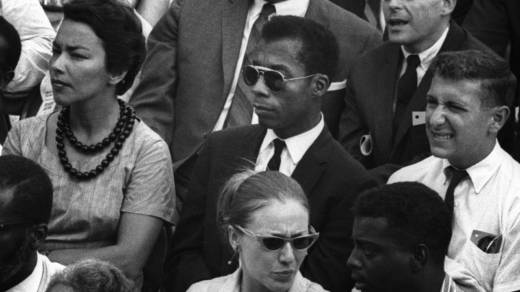James Baldwin is having a posthumous resurgence, but we are so in need of his words at this moment that it’s hard to believe he hasn’t still been writing every day since his death in 1987. In every genre Baldwin dabbled, from novels to political commentary to arts criticism, he found the core of our identity as a nation: a core that feeds off division and prejudice; that celebrates its own history while refusing to learn from it; and that was, and plainly remains, too painful for anyone other than him to talk about honestly.
Today’s media is flush with essayists who trace a direct line to Baldwin, the most prominent being Ta-Nehisi Coates, whose bestselling sensation Between the World and Me is a grim postscript to Baldwin’s The Fire Next Time, and dispels even the slim notion of hope for true racial justice Baldwin offered in 1963. But Baldwin refused to see himself as a “race writer”: Instead, he framed arguments for equality as pleas to save the entire American soul from corrosive hatred and isolation. The exceptional new documentary I Am Not Your Negro, which director Raoul Peck began to work on before the Obama presidency, gives us a fresh new view on Baldwin’s words, while also reminding us that the same American soul he struggled so hard to convince us was worth saving remains on life support today.
I Am Not Your Negro is also not your Baldwin CliffsNotes. Instead, Peck gives us a far more urgent, revelatory document: a visual imagining of the writer’s last, unfinished manuscript. Titled Remember This House, it was to be Baldwin’s personal reflection on the lives and assassinations of Martin Luther King Jr., Malcolm X, and Medgar Evers, all of whom he was close with. “I want these three lives to bang against and reveal each other,” Baldwin wrote. And as these lives bang, Baldwin’s (and Peck’s) gaze turns: from the Civil Rights struggles of the 1960s to America’s insistence on imagining great social progress where little has occurred.
The film uses only Baldwin’s words, superbly narrated by Samuel L. Jackson. There are no talking heads to put them “into context,” because the context is already there, in our history and all around us. Peck, working from 30 pages of raw text gifted him by Baldwin’s sister Gloria, animates the prose with archival news clips, still photographs, and scenes from popular films of Baldwin’s time. And he also, with dreamlike continuity, grants brief passage into the modern day: young black men shot by police, the Black Lives Matter protests, a montage of superficial apologies from white politicians. Robert Kennedy accurately predicts that America will see a black president 40 years from his time, and then Baldwin takes apart the idea that we had to wait so long in the first place.


